Telecommunications specialists are the backbone of modern communication systems. They ensure that data, voice, and video communications run smoothly across various platforms and networks, making sure that businesses and individuals stay connected.
Telecommunications specialists need a mix of technical and soft skills. These include knowledge of network infrastructure, proficiency in troubleshooting, and strong analytical abilities, as well as effective communication and teamwork skills.
Candidates can write these abilities in their resumes, but you can’t verify them without on-the-job Telecommunications Specialist skill tests.
In this post, we will explore 9 essential Telecommunications Specialist skills, 11 secondary skills and how to assess them so you can make informed hiring decisions.
Table of contents
9 fundamental Telecommunications Specialist skills and traits
The best skills for Telecommunications Specialists include Network Configuration, Troubleshooting, Protocol Knowledge, Security Management, Wireless Technologies, VoIP Systems, Data Analysis, Cloud Services and Project Management.
Let’s dive into the details by examining the 9 essential skills of a Telecommunications Specialist.
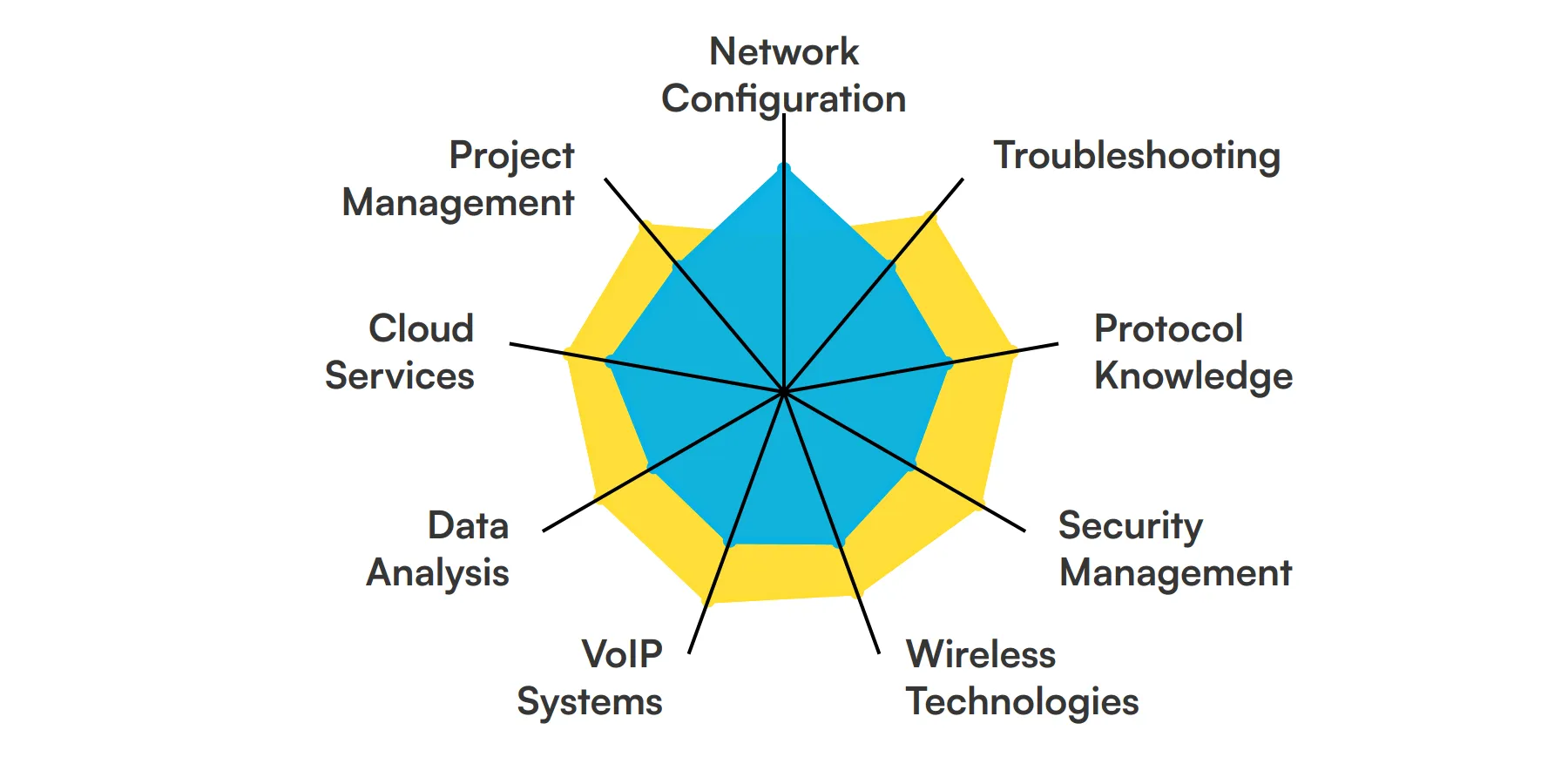
Network Configuration
A Telecommunications Specialist must be adept at configuring and managing network devices. This includes setting up routers, switches, and firewalls to ensure seamless communication across the network.
For more insights, check out our guide to writing a Network Engineer Job Description.
Troubleshooting
Identifying and resolving network issues is a key part of the role. This skill involves diagnosing problems, whether they are hardware or software-related, and implementing effective solutions to minimize downtime.
Protocol Knowledge
Understanding various communication protocols like TCP/IP, UDP, and VoIP is essential. A Telecommunications Specialist uses this knowledge to ensure data is transmitted efficiently and securely across the network.
Security Management
Implementing and maintaining network security measures is crucial. This includes configuring firewalls, managing VPNs, and ensuring compliance with security policies to protect sensitive data.
Check out our guide for a comprehensive list of interview questions.
Wireless Technologies
Proficiency in wireless communication technologies such as Wi-Fi, LTE, and 5G is important. This skill helps in designing and managing wireless networks to provide reliable connectivity.
VoIP Systems
Voice over Internet Protocol (VoIP) systems are integral to modern telecommunications. A specialist must be skilled in setting up and maintaining VoIP systems to ensure clear and reliable voice communication.
Data Analysis
Analyzing network performance data helps in identifying trends and potential issues. This skill enables a Telecommunications Specialist to optimize network performance and plan for future upgrades.
For more insights, check out our guide to writing a Data Analyst Job Description.
Cloud Services
Knowledge of cloud-based services and infrastructure is increasingly important. This includes understanding how to integrate and manage cloud solutions to enhance network capabilities.
Project Management
Managing telecommunications projects from inception to completion requires strong project management skills. This involves planning, executing, and overseeing projects to ensure they meet technical and business requirements.
11 secondary Telecommunications Specialist skills and traits
The best skills for Telecommunications Specialists include Scripting Languages, Vendor Management, Customer Support, Documentation, Compliance Knowledge, Disaster Recovery, Quality Assurance, Collaboration Tools, Hardware Installation, Time Management and Training.
Let’s dive into the details by examining the 11 secondary skills of a Telecommunications Specialist.
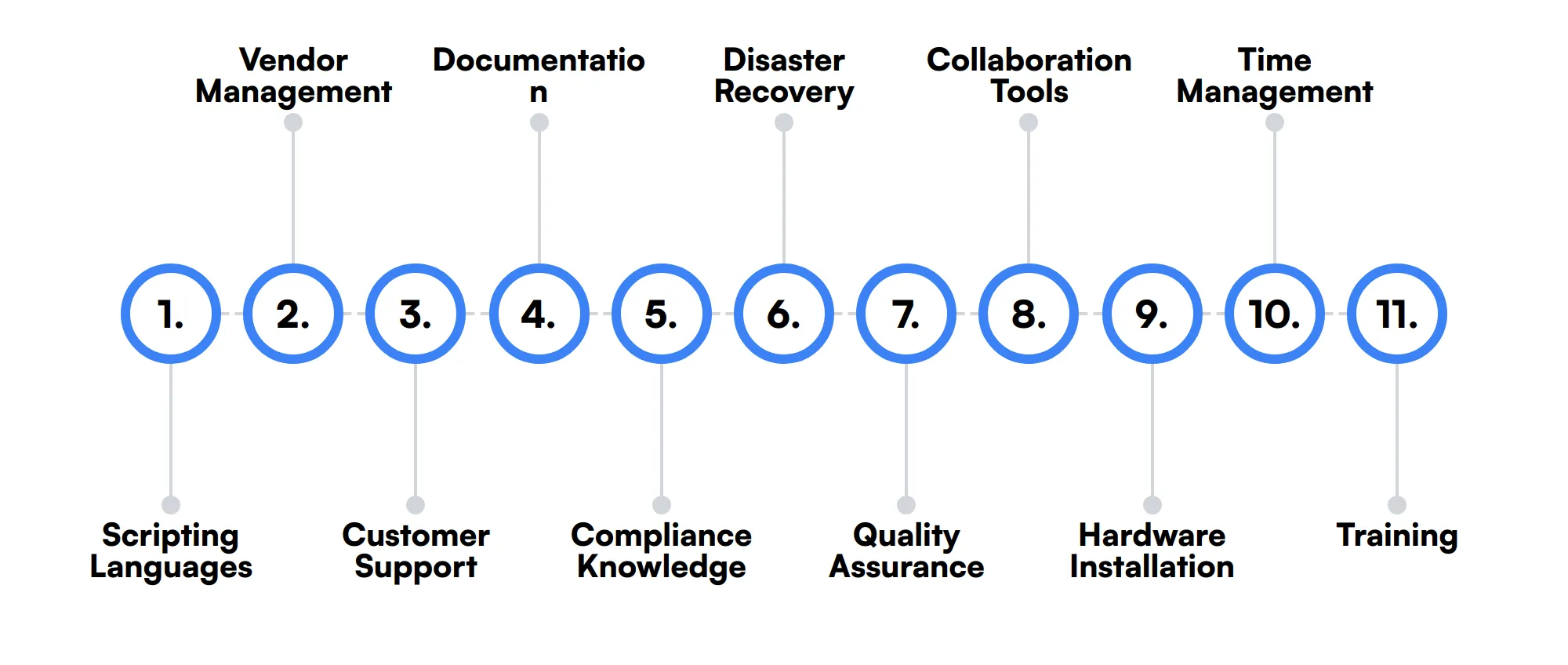
Scripting Languages
Familiarity with scripting languages like Python or Bash can be beneficial. These skills help automate routine tasks and streamline network management processes.
Vendor Management
Working with various hardware and software vendors is part of the job. Effective vendor management ensures that the telecommunications infrastructure is supported and maintained properly.
Customer Support
Providing technical support to end-users and clients is often required. This involves addressing their concerns, troubleshooting issues, and ensuring a positive user experience.
Documentation
Maintaining detailed documentation of network configurations, changes, and procedures is important. This ensures that there is a clear record for future reference and troubleshooting.
Compliance Knowledge
Understanding regulatory requirements and industry standards is necessary. This helps ensure that the telecommunications systems comply with legal and ethical guidelines.
Disaster Recovery
Planning and implementing disaster recovery strategies is crucial. This skill ensures that the network can quickly recover from unexpected events and continue operations with minimal disruption.
Quality Assurance
Ensuring the quality and reliability of telecommunications services is key. This involves regular testing and validation of network performance and services.
Collaboration Tools
Familiarity with collaboration tools like Microsoft Teams or Slack can be useful. These tools facilitate communication and coordination within the team and with other departments.
Hardware Installation
Installing and configuring telecommunications hardware is a part of the job. This includes setting up servers, switches, and other network devices.
Time Management
Effectively managing time and prioritizing tasks is important. This ensures that all projects and issues are addressed in a timely manner.
Training
Providing training to team members and end-users on new systems and technologies is often required. This helps ensure that everyone is up-to-date and can use the systems effectively.
How to assess Telecommunications Specialist skills and traits
Assessing the skills and traits of a Telecommunications Specialist can be a challenging task, given the wide range of technical proficiencies required. From network configuration and troubleshooting to security management and cloud services, these professionals need to be adept in various domains to ensure seamless communication systems.
Traditional resumes and certifications might give you a glimpse of a candidate's background, but they often fall short in revealing their true capabilities and fit for your specific needs. Skills-based assessments are a reliable way to measure a candidate's competencies and practical knowledge.
For a comprehensive evaluation, consider using Adaface on-the-job skill tests, which can help you achieve 2x improved quality of hires and an 85% reduction in screening time. These assessments can be tailored to cover key skills such as VoIP systems, data analysis, and project management, ensuring you find the right fit for your team.
Let’s look at how to assess Telecommunications Specialist skills with these 6 talent assessments.
Network Engineer Online Test
Our Network Engineer Online Test evaluates candidates on their technical knowledge and practical skills related to computer networking. This includes network protocols, network architecture, network security, IP addressing, subnetting, routing, switching, WAN technologies, network troubleshooting, and network management.
The test uses scenario-based multiple choice questions to assess candidates' proficiency in designing, implementing, and maintaining complex network infrastructures. It also evaluates their ability to diagnose and resolve network issues. Topics covered include network protocols, network security, routing and switching, and network performance optimization.
Successful candidates demonstrate a strong understanding of TCP/IP, LAN/WAN, and wireless networking. They also show proficiency in network design and network management.
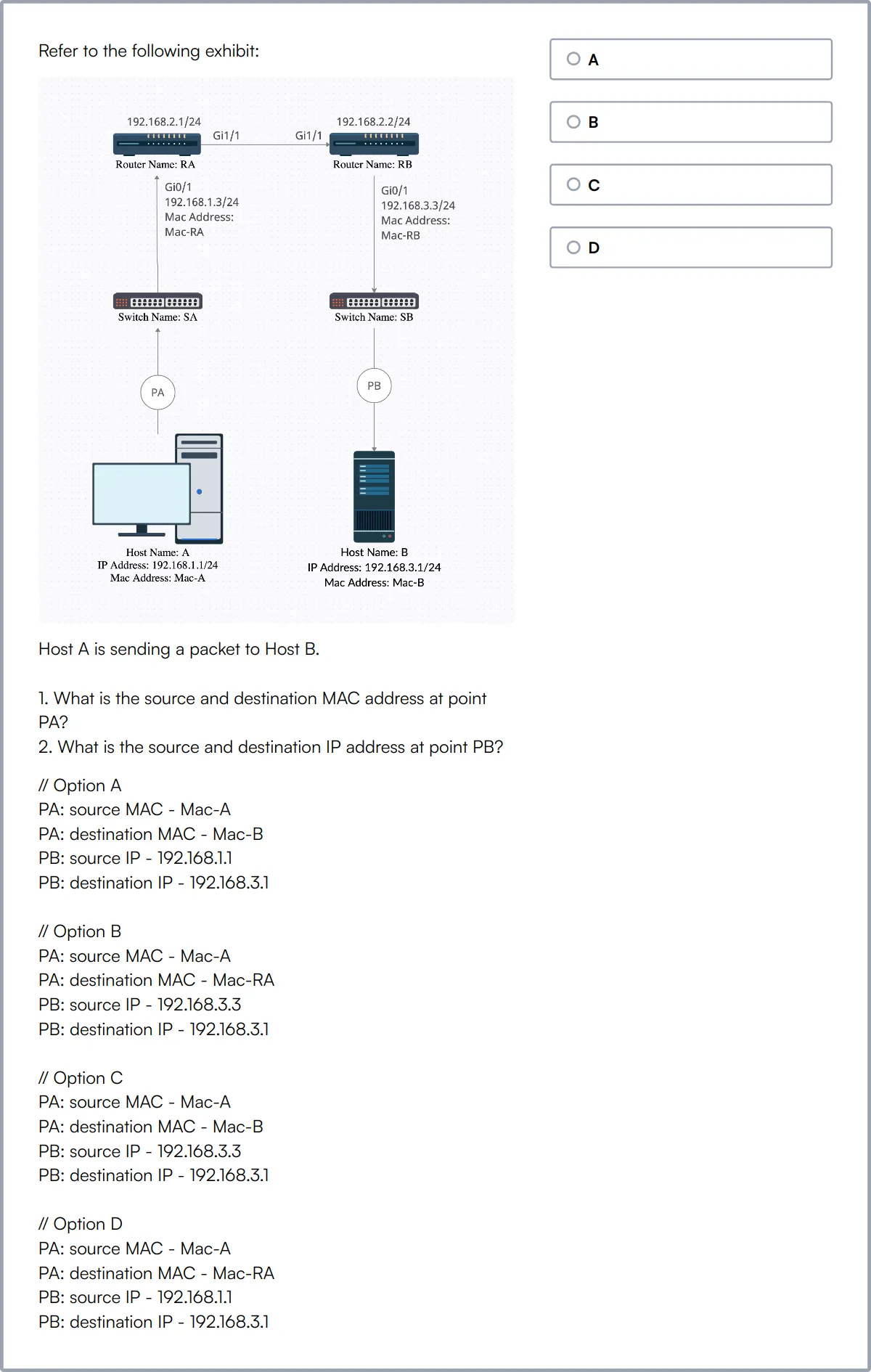
Technical Support Test
Our Technical Support Test assesses understanding of IT infrastructure, troubleshooting, and communication skills. It covers topics like operating systems, networking, hardware and software support, and IT service protocols.
The test includes multiple choice questions and situational judgement questions to measure problem-solving abilities and customer service skills in real-world technical issues. It covers operating system fundamentals, networking concepts, IT service protocols and standards, and incident reporting and documentation.
Candidates are also evaluated on their communication and customer service skills, problem-solving and critical thinking, and their ability to handle ITIL processes and procedures.
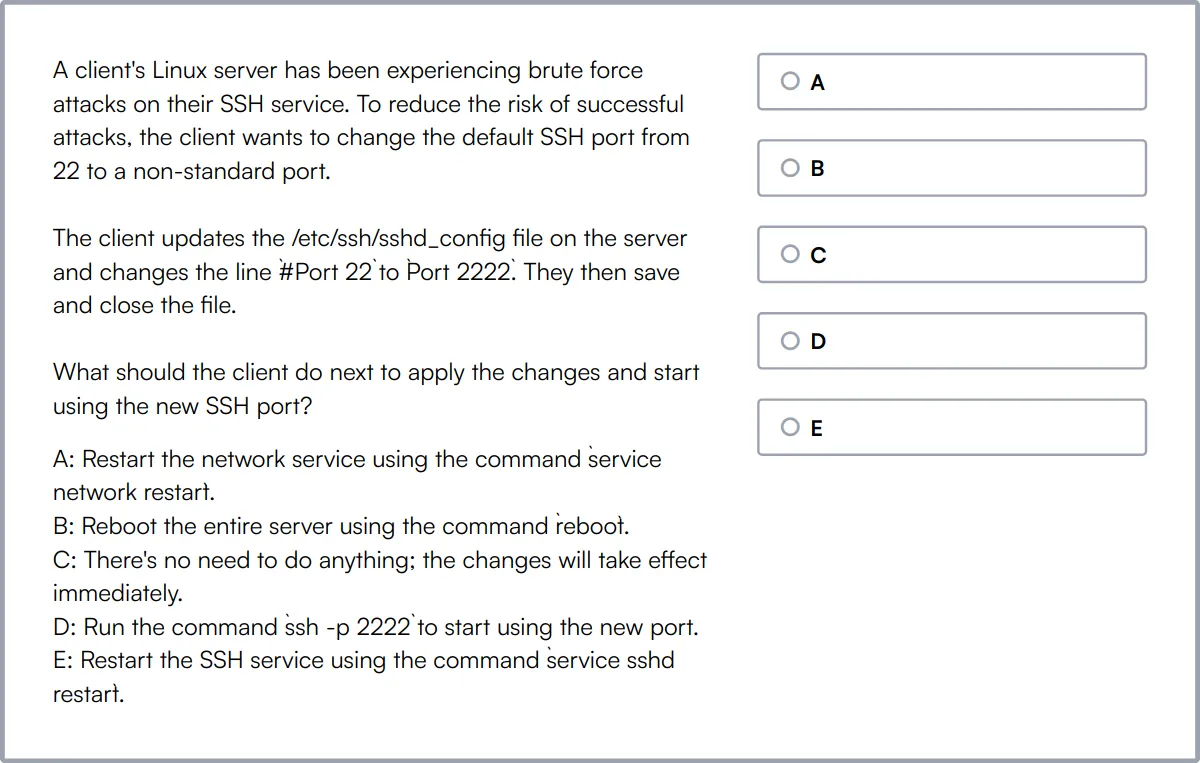
CISCO Routing Switching Test
Our CISCO Routing Switching Online Test evaluates candidates on their understanding of network routing and switching concepts and CISCO network equipment. It assesses knowledge of routing protocols, such as OSPF and BGP, and switching technologies, such as VLANs, STP, and EtherChannel.
The test uses scenario-based multiple choice questions to evaluate familiarity with CISCO networking devices, including routers and switches. It also assesses the ability to configure and troubleshoot these devices using command-line interface (CLI) and Simple Network Management Protocol (SNMP). Topics include Cisco router configuration, Cisco switch configuration, routing protocols, and network security.
High-scoring candidates demonstrate proficiency in IP addressing and subnetting, troubleshooting Cisco devices, and network management. They also show a strong understanding of WAN technologies and Quality of Service (QoS).
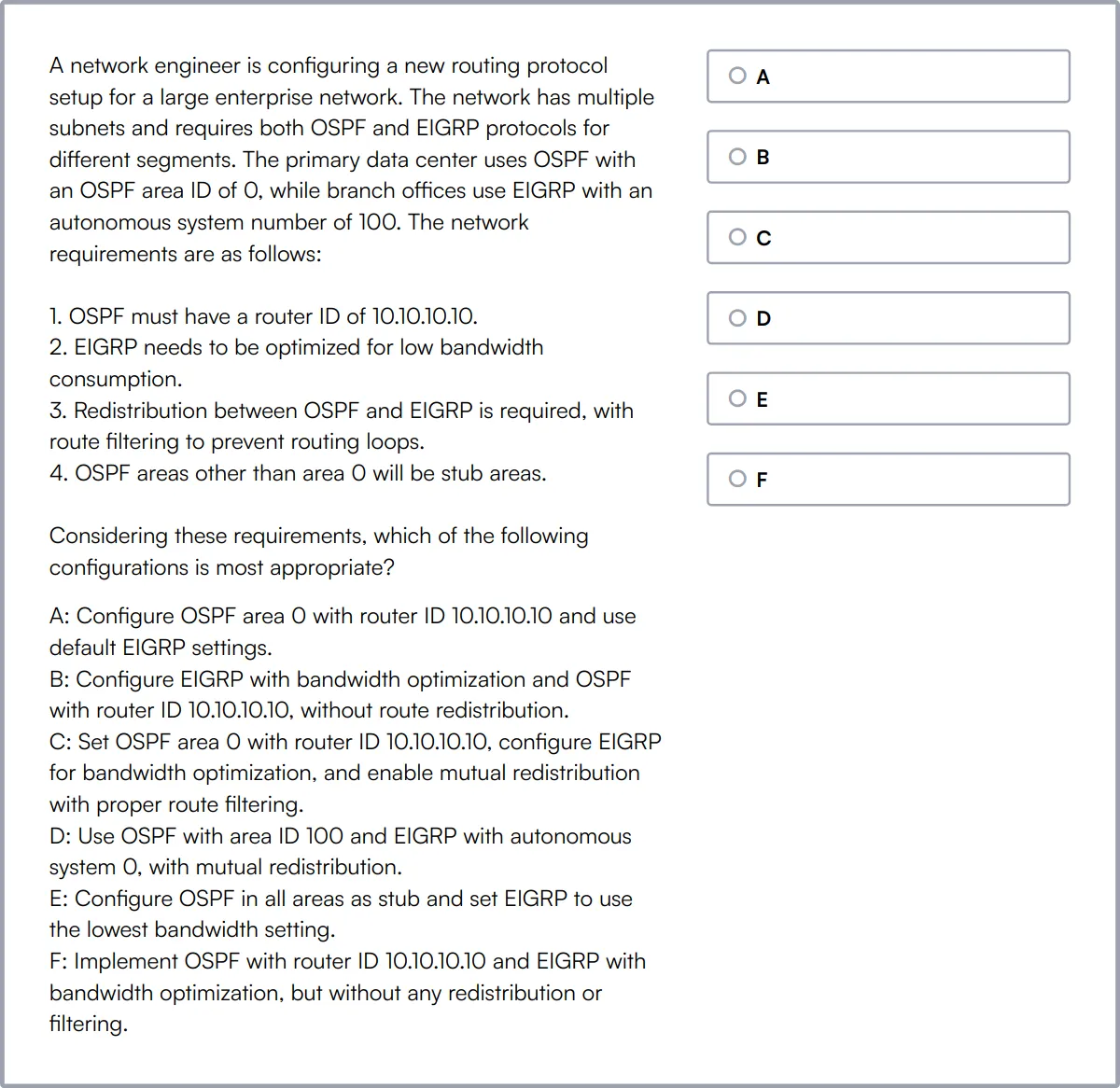
Cyber Security Assessment Test
Our Cyber Security Assessment Test evaluates candidates on Cyber Security basics, their ability to detect security risks, setup guards against future cyber attacks, and use cryptography techniques.
The test covers topics such as network security, cybersecurity attacks, cryptography, web security, and email security. It also assesses knowledge of malware, data security, data governance, and cybersecurity defenses.
Candidates are evaluated on their ability to perform risk assessments and network tests. They also demonstrate proficiency in penetration tests and setting up guards against DDoS attacks, proxy servers, VPNs, and firewalls.
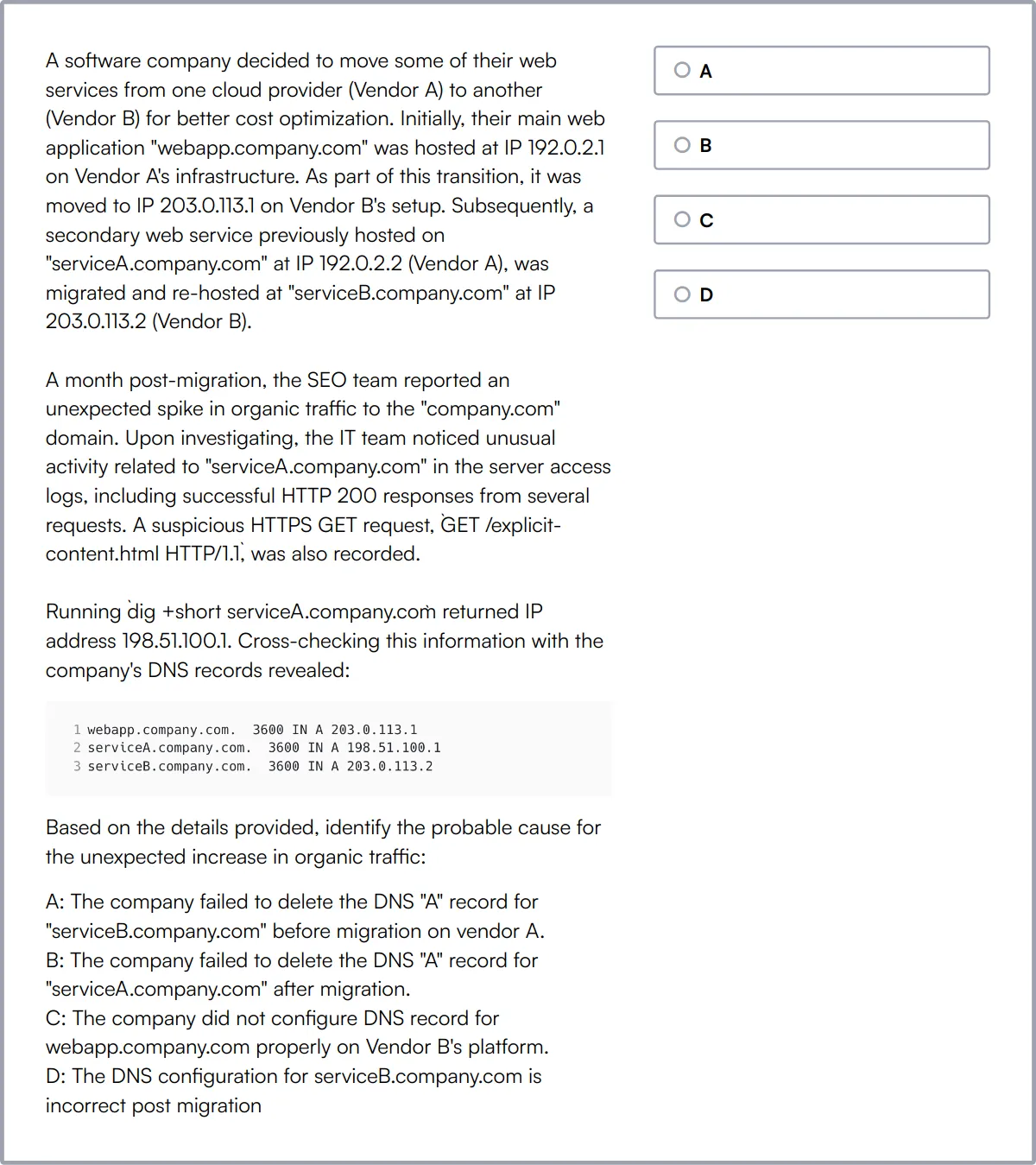
Data Analysis Test
Our Data Analysis Test assesses a candidate's ability to handle, modify, analyze, and interpret data. It uses scenario-based multiple choice questions to screen for experience with analyzing data to find possible outcomes, detect anomalies, extract meaningful insights, project estimates, and visualize data using charts and graphs.
The test covers topics such as data modelling, data analysis, business analysis fundamentals, data interpretation, and data queries and databases. It also includes questions on data operations, data investigations, and popular data tools.
Successful candidates demonstrate proficiency in SQL, data interpretation, and data analysis. They also show a strong understanding of business analysis fundamentals and the ability to use Excel for data visualization.

Cloud Computing Online Test
Our Cloud Computing Online Test evaluates a candidate's knowledge and understanding of various aspects of cloud computing. It assesses proficiency in topics such as cloud service models, deployment models, virtualization, security, scalability, storage and database management, networking, and orchestration.
The test includes multiple choice questions on cloud service models, cloud deployment models, virtualization in cloud computing, cloud security, and scalability and elasticity in cloud computing. It also covers cloud storage and database management, cloud networking, and cloud orchestration and automation.
Candidates are evaluated on their understanding of cloud computing providers and their ability to manage cloud security and cloud networking. They also demonstrate proficiency in cloud orchestration and automation.
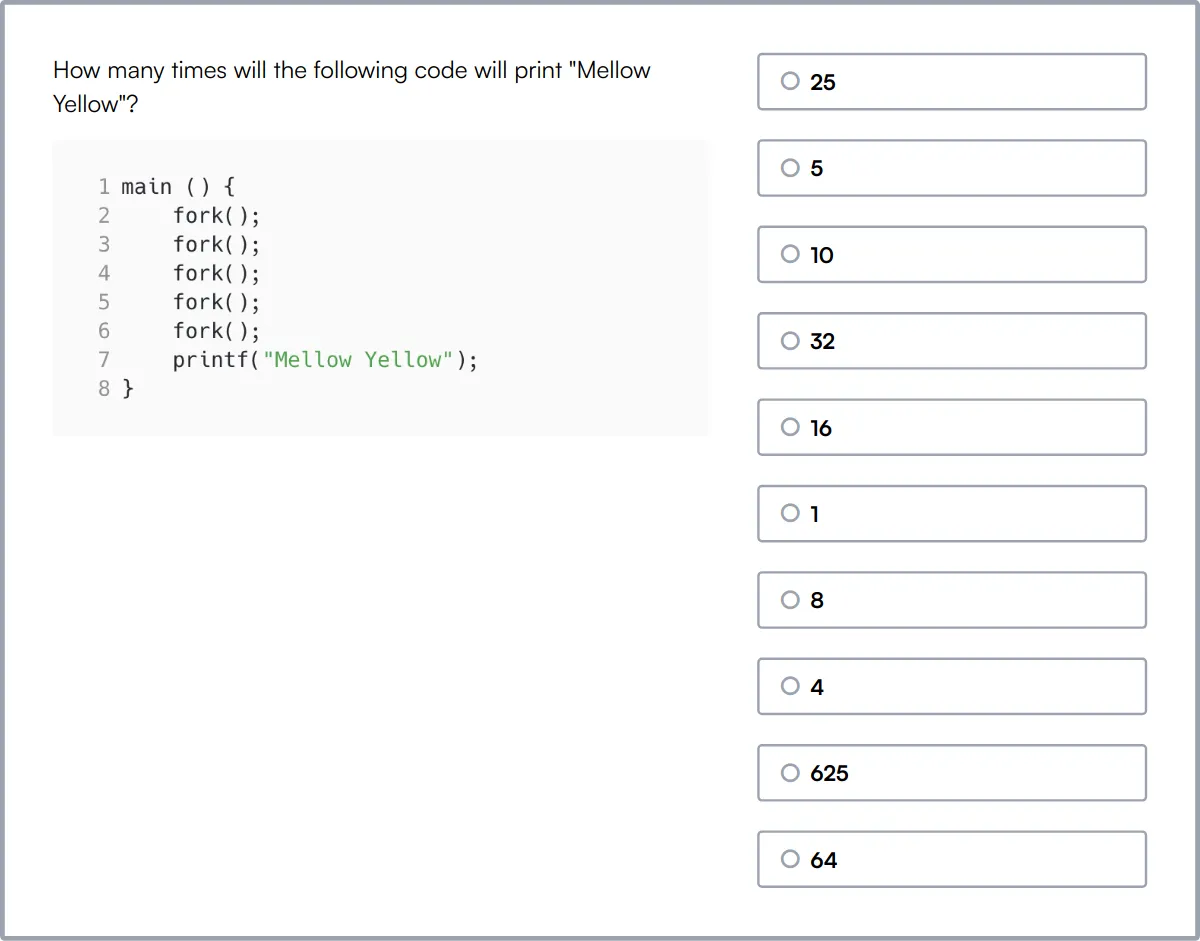
Summary: The 9 key Telecommunications Specialist skills and how to test for them
| Telecommunications Specialist skill | How to assess them |
|---|---|
| 1. Network Configuration | Evaluate ability to set up and manage network devices and settings. |
| 2. Troubleshooting | Assess problem-solving skills in identifying and resolving network issues. |
| 3. Protocol Knowledge | Check understanding of communication protocols like TCP/IP, HTTP, and FTP. |
| 4. Security Management | Gauge skills in implementing and maintaining network security measures. |
| 5. Wireless Technologies | Determine expertise in configuring and managing wireless networks. |
| 6. VoIP Systems | Evaluate proficiency in setting up and maintaining VoIP communication systems. |
| 7. Data Analysis | Assess ability to interpret and analyze network data for insights. |
| 8. Cloud Services | Check experience with cloud platforms and services like AWS or Azure. |
| 9. Project Management | Evaluate skills in planning, executing, and overseeing telecom projects. |
Software Support Specialist Test
Telecommunications Specialist skills FAQs
What skills are necessary for a Telecommunications Specialist to manage network configurations?
A Telecommunications Specialist should be proficient in configuring routers, switches, and other networking hardware. Understanding network protocols and being able to implement network security measures are also important.
How can troubleshooting skills be assessed during the hiring process for a Telecommunications Specialist?
Assess troubleshooting skills by presenting candidates with common network issues and asking them to outline their approach to solving these problems. Scenario-based questions or practical tests can effectively gauge their problem-solving abilities.
Why is knowledge of VoIP systems important for Telecommunications Specialists?
VoIP systems are integral for modern communication networks, offering cost-effective and flexible voice communication solutions. Specialists must understand VoIP configuration, maintenance, and security to ensure reliable service.
What role does data analysis play in the telecommunications sector?
Data analysis helps in understanding network traffic patterns, optimizing network performance, and predicting system failures. Telecommunications Specialists use analytical tools to make data-driven decisions for network improvements.
How important are project management skills for a Telecommunications Specialist?
Project management skills enable specialists to oversee projects from conception to completion, ensuring they meet deadlines and budgets. These skills are critical when deploying new technologies or upgrading existing systems.
What should recruiters look for when assessing a candidate's expertise in wireless technologies?
Recruiters should check for experience with various wireless standards, network planning, and security protocols. Practical experience or certifications in wireless network management can be good indicators of proficiency.
How can a Telecommunications Specialist's proficiency in scripting languages improve their work efficiency?
Scripting skills can automate routine tasks, streamline network configuration, and enhance troubleshooting processes. Assess candidates on their ability to write and understand scripts in languages like Python or Bash.
What is the significance of disaster recovery skills in telecommunications?
Disaster recovery skills are critical to ensure business continuity and data integrity in case of system failures. Specialists must be able to develop and implement effective recovery plans to minimize downtime and data loss.

40 min skill tests.
No trick questions.
Accurate shortlisting.
We make it easy for you to find the best candidates in your pipeline with a 40 min skills test.
Try for freeRelated posts
Free resources



